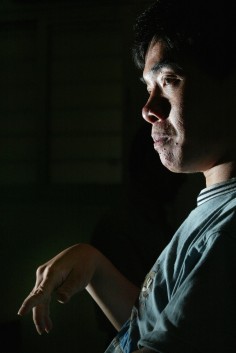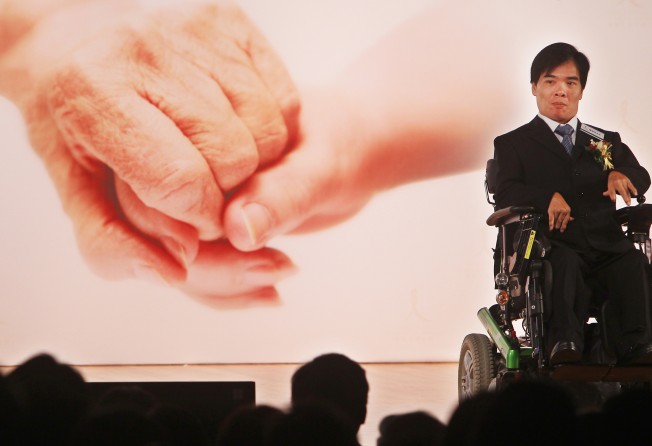
An independent thinker unfazed by his disability
Willy Law may be bound to a wheelchair, but his tenacious spirit has brought him far - from learning English to winning jobs for himself

Willy Law Wai-cheung, 50, spent the first 11 years of his life on the floor of his family's cramped public housing flat in Shek Kip Mei. His father was dead by the time he was six, and his mother supported the family by going out to clean every day, leaving her disabled child at home. Every morning, she would put his food on the floor and cover the rice with a heavy iron bowl - to stop the rats from eating it.

"I remember my brother first taking me down onto the street when I was 11 years old," says Law, who moves around in a German-designed electric wheelchair. He navigates his way around the MTR transport system easily, and the computer on his wheelchair allows him not only to steer but also to recline the chair when he needs rest.
Law's disabilities come from the vital minutes during which he was starved of oxygen when he nearly suffocated at birth. When he went to school at age 12, he was very shy, having had little exposure to people. But he later proved himself tenacious at acquiring employment.
At 28, Law was hired by a sympathetic factory owner after he pleaded with the man to give him a three-month probation in the packing room "because I couldn't stand another day at home". Because his fingers are gnarled, he was unable to pack, but his boss saw potential in him. Law had communication and management skills and he was adept on a computer, so he would later work for the man as a computer trainer.
Law's second job was as an insurance salesman for AIA at a time when public transport for wheelchair users was scarce. Even now, wheelchair users have to wait for several buses for one with a wheelchair facility. Up until he was 40, Law had just a manual wheelchair which his mother would push.
Video: The Independent lives of people with disabilities
But he was determined: he started making cold calls, and would take KMB's bus route 1A - which had wheelchair access - and chat with the other passengers to see if they wanted insurance. He would alight at factories and talk to the workers. "It was very tough and it took a while. But then I got my first customer."
These days, Law devotes all his time to improving the rights of people with severe disabilities. He regards Chief Secretary Carrie Lam Cheng Yuet-ngor as a close ally, with whom he has discussed human-rights policies for the past decade.
Over the last 10 years, he has been instrumental in ensuring that the Social Welfare Department pays for a helper for those with severe disabilities who want to live independently. "The alternative is that they live in a hospital or residential home," he says.
Recently, Law, with a close friend who is a video specialist, created a film with other severely disabled people, showing their everyday lives. Law did part of the filming with a camera strapped to his forehead. The film is now being shown in schools.
Law isn't looking for charity, he says. He wants equal status, respect and job opportunities. He believes that if employers want to pay disabled people less than the minimum wage because they are seen as less competitive, then the government should make up the difference.